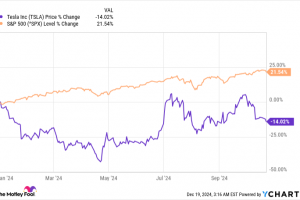
QuantumScape (NYSE: QS) posted its second-quarter report on July 24. Once again, the developer of solid-state batteries didn’t generate any meaningful revenue because it hadn’t commercialized any of its products yet. Its net loss widened year over year from $117 million to $123 million, or $0.25 per share, and missed analysts’ estimates by two cents.
On an adjusted earnings before interest, taxes, depreciation, and amortization (EBITDA) basis, its loss widened from $64 million to $73 million. It reiterated its previous full-year guidance for an adjusted EBITDA loss of $250 million to $300 million, which would be slightly wider than its adjusted EBITDA loss of $249 million in 2023.
Image source: Getty Images.
QuantumScape’s stock tumbled after that lackluster report, and it now trades 95% below its all-time high from December 2020. But could it recover over the next 12 months as it makes more progress toward commercializing its batteries?
What does QuantumScape do?
QuantumScape is developing solid-state batteries that generate power from solid electrolytes instead of the liquid electrolytes used in lithium-ion batteries. That difference allows them to be charged more quickly with higher capacities. They’re also more resistant to higher temperatures, less volatile, and last longer than their liquid-based counterparts.
Solid-state batteries are already used in smaller devices like pacemakers, wearables, and Internet of Things (IoT) gadgets, but they haven’t been widely installed in mobile devices or electric vehicles (EVs) because they’re expensive to mass produce. QuantumScape wants to establish an early mover’s advantage in this nascent market.
QuantumScape says is latest solid-state batteries can give EVs a range of 400 to 500 miles with a charging time of less than 15 minutes. By comparison, most lithium-ion batteries for EVs have a range of about 300 miles with an average charging time of 30 minutes. That range sounds like an ambitious goal, but Volkswagen has been working with the company for 12 years to develop and commercialize its first batteries.
When will…
..






